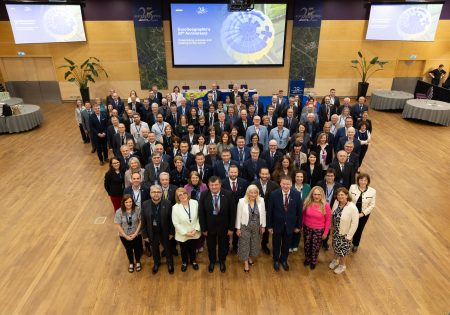OME2 adds five new countries to final release of Open Cadastral Map
 Five new countries have been added to the final release of the Open Cadastral Map which has been enhanced by the Open Maps For Europe 2 (OME2) project.
Five new countries have been added to the final release of the Open Cadastral Map which has been enhanced by the Open Maps For Europe 2 (OME2) project.
The addition of Belgium, Estonia, Ireland, Croatia, and Switzerland means the prototype map service now includes data from 15 of Europe’s National Mapping, Cadastral and Land Registration Authorities.
The OME2 project runs until the end of 2025 and is being delivered by a consortium comprising: EuroGeographics, the not-for-profit membership association for Europe’s National Mapping, Cadastral and Land Registration Authorities; National Geographic Institute, Belgium; National Institute of Geographic and Forest Information, France; Hellenic Cadastre; General Directorate for the Cadastre, Spain; and Cadastre, Land Registry and Mapping Agency, The Netherlands.
Angela Baker, Head of Partnerships and Sustainability, EuroGeographics said: “Open Cadastral Map compiles and harmonises INSPIRE open data to provide an overview of what is available and where to find it via user-friendly links for direct download from national geoportals. The vision is that this will provide the foundation for a single access point for easily finding and using authoritative cadastral information in the future.”
“Thanks to the OME2 Project, which is co-funded by the European Union, not only have we been able to expand the Open Cadastral Map, but, together with our members, we are also developing the pan-European Cadastral Data Strategy. This will be delivered by the end of 2025 and defines stakeholders as well as the technology, processes, resources and best practices required to support the long-term delivery of official high-value data for addresses, cadastral parcels, buildings and administrative units.”
The Open Cadastral Map is available through the Open Maps For Europe interface and signposts users to data from Belgium, Croatia, Czech Republic, Denmark, Estonia, Greece, Ireland, Latvia, Luxembourg, Poland, Slovakia, Slovenia, Spain, Switzerland, and The Netherlands
EuroGeographics is an international not-for-profit organisation (AISBL/ IVZW under Belgian Law. BCE registration: 833 607 112) and the membership association for the European National Mapping, Cadastral and Land Registry Authorities.
The OME2 project is co-funded by the European Union. It is being delivered by a consortium comprising: EuroGeographics, the not-for-profit membership association for Europe’s National Mapping, Cadastral and Land Registration Authorities; National Geographic Institute, Belgium; National Institute of Geographic and Forest Information, France; Hellenic Cadastre; General Directorate for the Cadastre, Spain; and Cadastre, Land Registry and Mapping Agency, The Netherlands. OME2 is developing a new production process and technical specification for free-to-use, edge-matched data under a single open licence. Authoritative 1:10 000 scale data for 10 countries will be delivered via the user interface built by the award-winning Open Maps For Europe Project. OME2 is also enhancing the five existing Open Maps For Europe datasets, including the Open Cadastral Map.
Views and opinions expressed are however those of the author only and do not necessarily reflect those of the European Union or European Commission. Neither the European Union nor the European Commission can be held responsible for them.


 Today there is a huge hole in the heart of the international geospatial community as we mourn the loss of our friend and colleague, Frank Tierolff, Chair of Kadaster Netherlands. Frank sadly passed away on Wednesday 2 July following a heart attack. He was only 57 years old.
Today there is a huge hole in the heart of the international geospatial community as we mourn the loss of our friend and colleague, Frank Tierolff, Chair of Kadaster Netherlands. Frank sadly passed away on Wednesday 2 July following a heart attack. He was only 57 years old. 

